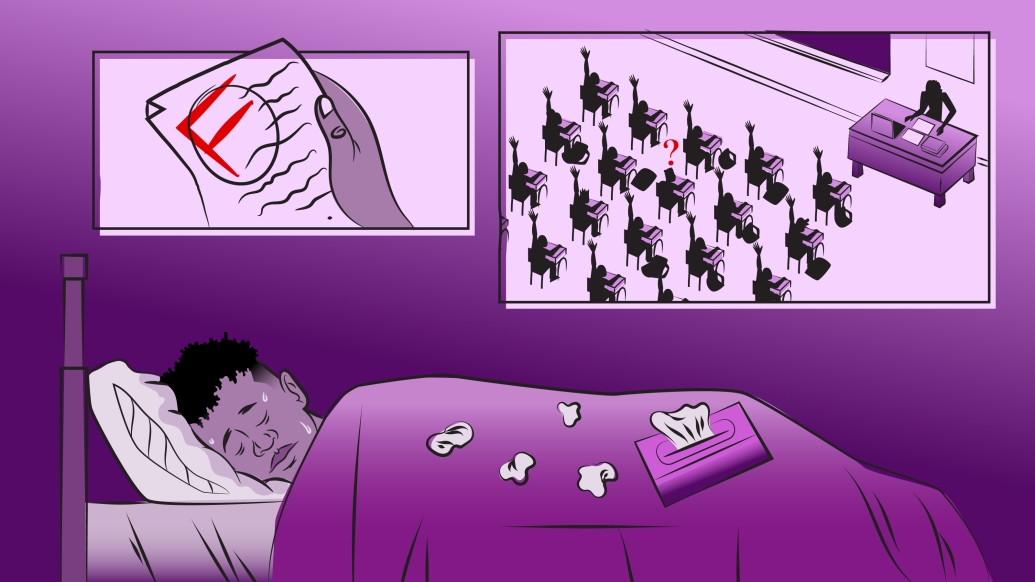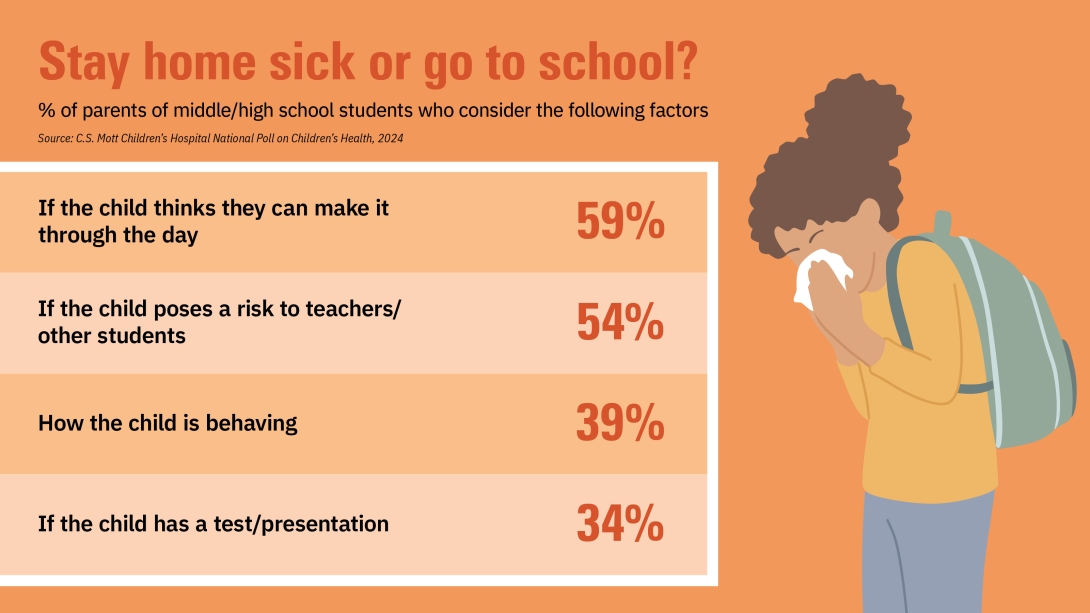National poll: 1 in 5 parents consider if their child needs a mental health day; 1 in 4 say attendance policies are challenging for kids with medical conditions
8:00 AM
Author |

Many parents struggle deciding whether their middle or high school aged child should stay home from school if they don’t feel well, a new national poll suggests.
Among top factors: how their adolescent or teen is behaving due to symptoms and if they can get through a school day; the risk that they’re contagious; and whether the student will miss a test, presentation or after school activity.
One in five parents also consider if their child needs a mental health day, according to the University of Michigan Health C.S. Mott Children’s Hospital National Poll on Children’s Health.
“In some cases, the decision to keep kids home from school is clear, such as if the child is vomiting or has a high fever,” said Mott Poll co-director Sarah Clark, M.P.H. “But parents often have to guess at whether their child’s report of ‘not feeling well’ represents a good reason to miss school.”
The nationally representative report is based on 1,300 responses from parents of children ages 11 to 18 surveyed in February 2024.

Sick day decisions go beyond physical illness
More than half of parents say they’re more likely to keep kids home just to be safe in situations where it’s unclear how sick their child is. Another quarter of parents would send their child to school and hope for the best while less than a fifth would let their child decide.
As grades become more important to adolescents and teens in junior and senior high school, many parents also include academic considerations in their sick day decision. Nearly two thirds of parents say their child worries about an absence’s negative impact on grades or missing friends or school activities.
Clark recommends parents ask more questions to learn about their child’s request to stay home. If it’s on the day of a test, she says, it may reflect their lack of preparation or anxiety about performing well.
Mental health day considerations
Many parents recognize increasing mental health concerns among children, reflected by the 19% who say they’re open to allowing a child to take a mental health day.
Clark notes that in some instances, face to face interactions may trigger or exacerbate mental health issues, such as a breakup with a romantic partner, a falling out with friends, or an embarrassing incident shared on social media.
“It’s understandable that students may fear facing peers in uncomfortable social situations, but they can’t miss school every time they expect an unpleasant interaction,” she said.
“Facing discomfort is a natural part of life, and parents play an important role in helping kids to learn how to navigate these challenges in order to build resilience and develop healthy strategies for handling social stressors.”
In balancing their decisions about allowing their child a mental health day, parents may think about the purpose of the day away from school, she says. It may be an opportunity to help their child plan how to handle interactions, practice strategies to stay calm and ease anxiety, and identify specific peers, teachers or staff who could be sources of support.
For children who have been diagnosed with depression or anxiety, missing school may be necessary to sustain the child’s well-being, Clark says. Parents should consult with their child’s mental health provider for guidance.
Complying with school attendance policies
Nearly all parents polled say their school has an attendance policy, which they felt was necessary to ensure children go to school consistently. The majority of parents also think the amount and timeframe for making up missed schoolwork is reasonable.
However, many also acknowledge that compliance with school attendance policies can be particularly challenging for children with chronic medical conditions who often miss school due to medical visits or to avoid exacerbations of their condition.
“Parents agreed that attendance policies are important to preventing truancy or excessive absenteeism linked to poor school performance,” Clark said.
“However, parents of children with health issues that require traveling to regular appointments and even hospitalizations may need to have conversations with school administrators and teachers about the likelihood of health related absences. These families may need to enlist the child’s healthcare providers for support in requesting school flexibility in completing assignments at home or with additional time.”
Sign up for Health Lab newsletters today. Get medical tips from top experts and learn about new scientific discoveries every week by subscribing to Health Lab’s two newsletters, Health & Wellness and Research & Innovation.
Sign up for the Health Lab Podcast: Add us on Spotify, Apple Podcasts or wherever you get you listen to your favorite shows.

Explore a variety of health care news & stories by visiting the Health Lab home page for more articles.

Department of Communication at Michigan Medicine

Want top health & research news weekly? Sign up for Health Lab’s newsletters today!





